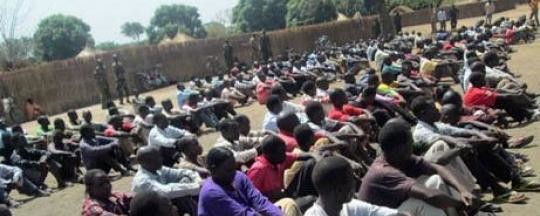Military and police officers from the Dinka Malual tribe of Northern Bahr al Ghazal have defended the creation of the Mathiang Anyoor militia, which critics say was recruited prior to December 2013 without official records and without the approval of SPLA General Headquarters at Bilpham.
The so-called ‘Mathiang Anyoor’ were recruited before the civil war started from only one ethnic group in the president’s home state Warrap and neighboring Northern Bahr al Ghazal.
President Salva Kiir himself has acknowledged that the Mathiang Anyoor were not supplied by the army before the war but by several of his political allies including at least two state governors. However, though the group came into existence allegedly without the army headquarters’ approval in 2012 to 2013, throughout 2014 many of the Mathiang Anyoor have been integrated into the official army.
Speaking at SPLA Division 3 headquarters at Wunyiik on Tuesday, on the occasion of ceremonies for promotions of new officers and non-commissioned officers, two senior military and police officers defended the role of the Mathiang Anyoor in the war.
Police Commissioner General Akot Deng said the Mathiang Anyoor had been created as part of a secret “plan” without explaining its purpose.
“I and [Maj-Gen. Santino] Deng Wol and [then-Governor] Paul Malong, our plan that was a plan from a long time ago – not now. Have you seen those Mathiang Anyoor as they are called? Previously, were being insulted, and we were being asked what are you going to do with that army? But had it not been for Mathiang Anyoor would there still be a South Sudan now?” he said.
Akot implied that the ‘Mathiang Anyoor’ were recruited as part of the army’s normal recruitment process. This contradicts former military and security officials who were quoted in an African Union Commission of Inquiry report as saying that the pre-war mobilization was not officially sanctioned.
“This was never a government program, but a local initiative,” Minister of Interior Aleu Ayieny told AU investigators.
General Manyang Mayen, who spoke on behalf of promoted officers on Tuesday, praised both the official army force stationed in Northern Bahr al Ghazal – Division 3 – and the unofficial recruits of ‘Mathiang Anyoor’ hailing from the area.
“We the people who have been promoted whether from Abyei or Gok Machar and elsewhere thank President Salva Kiir Mayardit and the people of South Sudan,” he said. “We also thank the people of Northern Bahr el Ghazal and their government, because Northen Bahr al Ghazal and Warrap State stood with us strongly as Lion Divison [Division 3].”
He proceeded to praise the troops who had been trained at Pantiit – a reference to the Mathiang Anyoor who were stationed at Pantiit before being mobilized to a private farm near Juba owned by Salva Kiir shortly before the events of mid-December 2013.
The general noted that these troops were supplied not by the army but by the resources of the states from which they were mobilized. He thanked those who supported them.
“There were people who were at the [training centre] at Pantiit whom we all sent to Juba to rescue South Sudan. All those, that is a force of Northern Bahr el Ghazal State and Warrap State which donated the sorghum and any other things under the leadership of [Governor] Nyandeng Malek.”
The event was also attended by Northern Bahr al Ghazal State officials including Acting Governor Salva Chol Ayat, and SPLA Division 3 Commander Major General Santino Deng Wol. The SPLA did not disclose how many officers and non-commissioned officers were promoted in total.
File photo
Related:
Generals say Juba massacres done by private militia, not SPLA (9 March)
Timeline: Formation of the ‘Mathiang Anyoor’ in South Sudan (9 March)




